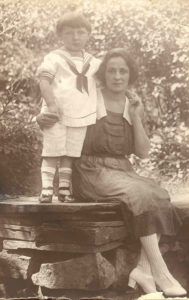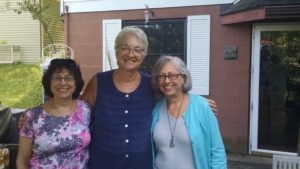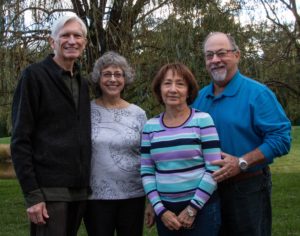Growing up in Detroit, my father Isadore Goldstein didn’t talk much about his family. He occasionally mentioned “Tante Chaika” or a cousin Bella, or his father’s brothers by name, but he never really said anything about these people or how they were related. We didn’t see photos and when we went to visit family in New York, that meant visiting my mother Ethel Battalen Goldstein’s family. We stayed with her sister and her husband, Lucy and Julie Fass, and we would have a brief visit with my father’s parents. They seemed old and didn’t relate to us much; my grandmother never hugged, kissed or interacted with me that I remember. My grandfather Sol was moderately affectionate; I’d give him a kiss and could smell his cigarettes, he’d slip us each a dollar. Mostly he and my father shared a schnapps and then Sol listened as my father held forth, always exclaiming how smart his son was. Occasionally we’d get together with my Aunts Jeanette and Annette and their families, but these brief visits were too few and far between to really get to know them well.
I knew that I was named for my mother’s father, Louis, and that my sister Frannie was named for her mother, Fannie. How did my brother Mark get his name? They liked the letter “m.”
We had heard that my father had cousins in Detroit but the fact that we never knew their names and had never met them meant little; that’s just how it was, and somehow, we knew not to question. When you’re a little kid, whatever your reality is seems to be what is normal.
In 1967, when I was 16, I was looking for something in an old dresser drawer and came across some old photos. The man and boy were clearly my grandfather and my father as a toddler, but the woman was unfamiliar. I took them to my mother and said, “Is this Grandma?” She said nothing for a long time and finally said, “That’s a grandmother.” I asked what that meant, and she said, “Ask your father.”

When he got home I showed him the photos and asked him. He replied that the woman was his mother and not the grandmother I knew. What had happened? She died, he said, of “melancholia.” I asked what that meant, and he said that she had killed herself and that within a year his father had remarried, to the woman we knew as our grandmother. Between the death and the remarriage, Jeanette was sent to live with Tante Chaike and her family, while Sol and Isadore lived with Sol’s brothers.
You can just imagine the impact this had on the three of us! Now we knew that my parents liked the letter “m” because Dad’s mother’s name was Mollie. That she had killed herself and had been depressed during his childhood, we thought, explained much about our father (although, really, who knows?). Looking back, although I was always interested in family history, this was probably the beginning of my passionate descent down the rabbit hole that is genealogical research.
My sister Frannie Goldstein worked for a cemetery corporation in New York in the 1970’s and was able to locate Mollie’s grave and she took a picture. From the tombstone we learned her father’s name, the date of her death and that she died during Pesach – all valuable information. I was able to get her death certificate, but for many years could get no further despite concerted searching, including on the Internet where so much information eventually became available. I decided to work laterally and focus on her siblings; perhaps I could learn something about Mollie that way.
My father once told me that his Uncle Harry had told him that he’d written a letter for his nephew to be given to him when he, Harry, died. However, my father never received this letter. I knew that Harry’s obituary could provide some family names, so in 1999 or 2000 I sent a letter to the Detroit Jewish News, asking if anyone had any information on him (in those days, not everything was online). My query was published, and I received a letter from a woman who had worked with my father’s cousin Esther Challov Politzer and she provided me with some names. From there I was able to locate Esther’s son, John; we spoke on the phone and he referred me to his sister Jill Krach and his cousin Tasha Lebow. I spoke with both of them and everyone was very excited. After visiting my daughter Sara at the Interlaken Arts Camp in Michigan in 2000, I drove down to Hell, MI, near Ann Arbor, to meet Tasha and her family. My sister Frannie and her son Auren drove in from Southfield, MI for the meeting.

When Tasha opened her door and we looked at each other, we both felt like we were looking in a mirror. The resemblance is much more striking in photos of us when we were younger, but still, there’s something there. Later that year we got a chance to meet John Politzer, though I haven’t seen him since.
At long last, the Detroit cousins! It turned out they had grown up not far from us. Tasha used to ride her bike right by the Sholem Aleichem Institute, where we went to Hebrew school. Had we not moved to suburban Southfield, she and I would have been in the same class at Henry Ford High School. Tasha remembers going to a Purim carnival with us once and being happy that she was no longer the youngest of all the cousins (now Frannie was), but we never met again, and I have no memory of that event.
My father and his cousins Esther and Bella did not get along. They were several years older than he; when he visited Detroit at age ten, they found him to be a smart-aleck know-it-all; this was not an inaccurate characterization. When he and my mother moved to Detroit in 1950 they all got together a few times, but it didn’t go well. The cousins’ husbands didn’t take to him, either; I suspect too many people thought they were alpha males for it to have been an enjoyable experience. Sadly, the result was complete estrangement and we essentially had no family in Detroit.
Nevertheless, now we had found each other. I haven’t met Tasha’s sister Lori, who lives in Australia. Jill and I planned to meet as she lived relatively near me in suburban Chicago, but she needed a sudden surgery and the meeting never happened, though we did exchange holiday cards. She died a few years ago of cancer.
The translation and organization of a series of letters between my maternal grandparents took up many years of my genealogical energy and resulted in a book, completed a few years ago. At that point I was finally able to turn my attention back to my paternal side. Looking at the family tree and the names my father had given me, I knew that only one of Tante Chaike’s children, Celia, had married, but he didn’t know her married name. Through research I was able to discover that she had married Benjamin Klotz and from there it didn’t take long to locate Lewis Klotz and Lorri Greif, their children.

I took a deep breath and, as I had almost twenty years earlier, picked up the phone. My only regret, that of all genealogists, is that I hadn’t done so sooner. But I’m eternally grateful that when I finally did, the voices on the other end were receptive, welcoming and happy to hear from me – just like family.